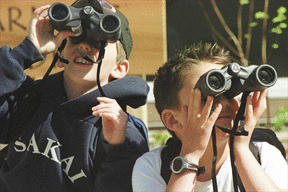Like the students crowded around him, naturalist Stan Rullman listens to the beep of the radio receiver as if he is hearing it for the first time.
He is.
“We’ve never been able to detect Grace’s signal from here before,” he tells the group of Island School fourth-graders gathered for their first full day of camp at the Puget Sound Environmental Learning Center.
Rullman is beaming – and he’s not the only one. Swinging the antenna around in a circle, the students search excitedly for evidence that Grace, a barred owl that Rullman and other wildlife experts have tagged with a radio transmitter, is close by.
They know what to listen for; they’ve just finished a practice hunt for a “non-migratory” bird on the campus – a rubber chicken hidden in a tree stump, with a transmitter tied to its neck.
Rullman, one of five full-time naturalists on the PSELC staff, is impressed with how quickly the kids are catching on.
“This is graduate-school and wildlife-biologist technology the kids are using,” he said.
Except, perhaps, for the bag of Chips Ahoy cookies hidden with the rubber chicken. Camp is still camp, after all.
The Island Schoolers are the first group of Bainbridge students to participate in the PSELC’s four-day overnight program, which the center launched in April.
“We want Bainbridge Islanders to feel like this is their place, too,” said Karen Matsumoto, PSELC’s school partnership coordinator.
It’s also a key step in developing the environmental studies curriculum that will be in place when the 255-acre Port Blakely campus officially opens in September, Matsumoto said.
“We are really grateful to have these kids testing out the program,” she said.
It’s a role that the Island School group – one of just a dozen schools that will go through the pilot program by the time it is completed in June – has taken on with gusto.
“I’m really excited that we are the first group of Bainbridge kids to come here,” said one student. “For most of the first night, I was half asleep and half awake.”
For the group’s teacher, Beth Layton, the residential program hasn’t exactly been restful. But it has meant less work than the other four-day outings the fourth-grade class had made in the past.
“We used to have to worry about supplies, do our own cooking, our own everything,” Layton said. “Here’s there’s not much extra work to do, other than collect permission slips.”
Working with PSELC staff, who visited the school several times before the class arrived on campus, Layton tailored the PSELC’s offerings to her class’s needs.
She opted, for example, for hands-on lessons on the region’s watershed, rather than activities focused on the island’s cultural history, which her class had just spent more than a month studying.
Although the curriculum for the residential programs has been under development by staff and graduate students since October, there are still a few bugs to be worked out, Rullman acknowledged – as his lesson in using a compass to determine the direction of Grace’s signal left a few students baffled.
Still, Rullman said he is thrilled by the possibilities.
“Getting students to collect research data – that’s exciting to me,” he said.
Although the center is in their “back yard,” Layton hasn’t seen the students familiarity with the place breed contempt.
“This could be, in a sense, anyplace,” she said. “You feel like when you come through that gate that you have entered someplace new.”
At the same time, the lessons learned at the center are immediately applicable to their immediate world, she said.
“They are learning that there are different ways of doing what they already do,” Layton said.
“I think they’ll have a greater awareness of the place where they live.”
Although she doesn’t expect the PSELC to take the place of excursions to the Wooden Boat Foundation and other staples of environmental education for her school, it’s a first-time experience that Layton expects looks to happen again.
“I’ve already heard several kids say they intend to come back for the summer programs here,” she said.
“It exceeded my expectations. We’re already signed up for next year.”



